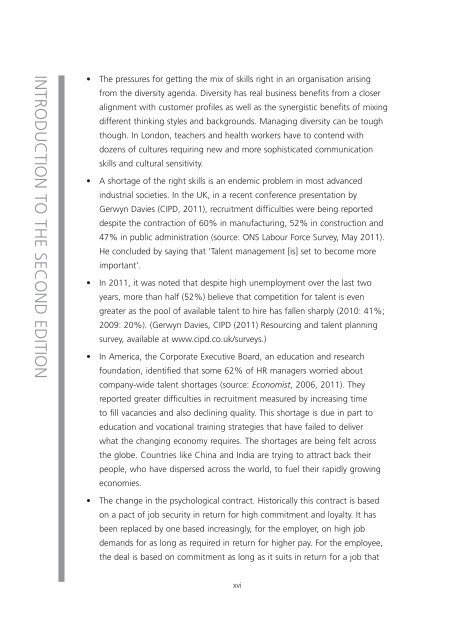Talent Management and Succession Planning - CIPD
Talent Management and Succession Planning - CIPD
Talent Management and Succession Planning - CIPD
You also want an ePaper? Increase the reach of your titles
YUMPU automatically turns print PDFs into web optimized ePapers that Google loves.
INTRODUCTION TO ThE SECOND EDITION<br />
• The pressures for getting the mix of skills right in an organisation arising<br />
from the diversity agenda. Diversity has real business benefits from a closer<br />
alignment with customer profiles as well as the synergistic benefits of mixing<br />
different thinking styles <strong>and</strong> backgrounds. Managing diversity can be tough<br />
though. In London, teachers <strong>and</strong> health workers have to contend with<br />
dozens of cultures requiring new <strong>and</strong> more sophisticated communication<br />
skills <strong>and</strong> cultural sensitivity.<br />
• A shortage of the right skills is an endemic problem in most advanced<br />
industrial societies. In the UK, in a recent conference presentation by<br />
Gerwyn Davies (<strong>CIPD</strong>, 2011), recruitment difficulties were being reported<br />
despite the contraction of 60% in manufacturing, 52% in construction <strong>and</strong><br />
47% in public administration (source: ONS Labour Force Survey, May 2011).<br />
he concluded by saying that ‘<strong>Talent</strong> management [is] set to become more<br />
important’.<br />
• In 2011, it was noted that despite high unemployment over the last two<br />
years, more than half (52%) believe that competition for talent is even<br />
greater as the pool of available talent to hire has fallen sharply (2010: 41%;<br />
2009: 20%). (Gerwyn Davies, <strong>CIPD</strong> (2011) Resourcing <strong>and</strong> talent planning<br />
survey, available at www.cipd.co.uk/surveys.)<br />
• In America, the Corporate Executive Board, an education <strong>and</strong> research<br />
foundation, identified that some 62% of hR managers worried about<br />
company-wide talent shortages (source: Economist, 2006, 2011). They<br />
reported greater difficulties in recruitment measured by increasing time<br />
to fill vacancies <strong>and</strong> also declining quality. This shortage is due in part to<br />
education <strong>and</strong> vocational training strategies that have failed to deliver<br />
what the changing economy requires. The shortages are being felt across<br />
the globe. Countries like China <strong>and</strong> India are trying to attract back their<br />
people, who have dispersed across the world, to fuel their rapidly growing<br />
economies.<br />
• The change in the psychological contract. historically this contract is based<br />
on a pact of job security in return for high commitment <strong>and</strong> loyalty. It has<br />
been replaced by one based increasingly, for the employer, on high job<br />
dem<strong>and</strong>s for as long as required in return for higher pay. For the employee,<br />
the deal is based on commitment as long as it suits in return for a job that<br />
xvi<br />
A sample from <strong>Talent</strong> <strong>Management</strong> <strong>and</strong> <strong>Succession</strong> <strong>Planning</strong> 2nd Edition by James A Cannon<br />
<strong>and</strong> Rita McGee. Published by the <strong>CIPD</strong>. Copyright <strong>CIPD</strong> © 2010. All rights reserved. No part<br />
of this excerpt may be reproduced, stored in a retrieval system, or transmitted, in any form<br />
or by any means, electronic, mechanical, photocopying, recording, or otherwise. www.cipd.<br />
co.uk/Bookstore

















